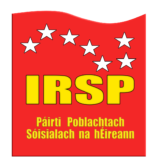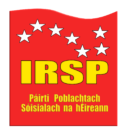8 March 2012
Irish Republican Socialist Committees of North America
International Women’s Day Statement
On behalf of the Irish Republican Socialist Movement, the Irish Republican Socialist Committees of North America issues the following statement on International Women’s Day.
International Women’s Day is observed on 8 March every year to celebrate the economic, political, and social achievements of women and to call for full gender equality worldwide. We believe that the day’s history with explicitly socialist and working class dimensions is especially worthy of celebrating, along with continuing the fight for women’s liberation in the context of the broader class struggle.
As Alexandra Kollontai recognized in 1920, International Women’s Day must be “a day of international solidarity, and a day for reviewing the strength and organization” of working class women.
In May 1908, the Socialist Party of America designated the last Sunday in February for the observance of National Woman’s Day, which was celebrated for the first time on 28 February 1909. In 1910, at the initiative of Clara Zetkin and other socialist women, the Second International established the first International Woman’s Day under the slogan, “The vote for women will unite our strength in the struggle for socialism.” The first was held on 19 March 1911 in several European nations. In Austria, celebrations began a day earlier, with women carrying red flags in honor of the 40th anniversary of the establishment of the Paris Commune.
In 1917, with two million Russian soldiers dead in World War I and a badly deteriorating economy, workers in Petrograd began striking and demonstrating. On 23 February (by the Julian calendar used in Russia, or 8 March by the Gregorian calendar), women began demonstrating with a demand for peace and bread. A march to factories by the women brought out 50,000 striking workers in solidarity. The women’s uprising was part of the broader February Revolution. Four days later, the Czar was forced to abdicate and the provisional government became the first government of a major power to grant women the right to vote.
While the IRSCNA recognizes that women have made economic, political, and social gains, we must point out that this is not the same thing as liberation. Women, especially middle class women, in western capitalist nations may have more life options now than at any time in the past, but throughout the world women, especially workers and peasants, continue to be victims of poverty, labor exploitation, sexual exploitation, violence, rape, and oppression by religious fundamentalists. The modern day slave trade profits from exploiting women sexually, and the number of women who have been victimized by this trade is staggering.
Wherever there are workers exploited by capitalism, there are workers who are doubly oppressed as both workers and as women. Lesbian, bisexual, and transgender women face further oppression and violence based on their sexual and gender identities.
The bodies of women are still considered contested terrain by reactionaries. In Ireland, the right for women to make decisions about their bodies and the medical procedures performed upon them is severely restricted. In the US, where that right is recognized, it is presently under severe assault by a resurgent and misogynistic Right, which wants nothing more than to roll back the clock on the rights women won through decades of struggle, whether those be reproductive rights or economic rights.
The Irish Republican Socialist Movement has always been at the forefront of supporting women’s liberation, and women have always been an integral part of our movement. When the Irish Republican Socialist Party was founded on 8 December 1974, four women were elected to its first national executive. Its second chairperson, Miriam Daly, was a woman, and at one point in the early 1980s, much of the party’s leadership was female. Women were also active as volunteers in the Irish National Liberation Army during decades of armed struggle against British occupation, just as Constance Markievicz was a leader in the Irish Citizen Army during the Easter Rising of 1916. At its first Ard Fheis (convention) in 1975, the IRSP became one of the first parties in Ireland to support a woman’s right to choose abortion, and to call for full equality for gays and lesbians. At the 2000 Ard Fheis, bisexuals and transgender people were explicitly recognized in a new equality statement passed by those assembled.
The war on workers is also a war on working women. Working women are forced to sell their labor power to survive, while women in the home perform unpaid labor that benefits the capitalist system. Women make up a larger percentage of the paid labor force than ever before, and in some nations, they outnumber men. Supporting women’s struggles is an essential part of socialism, and indeed the liberation of women is in the interest of the working class as a whole. There can be no working class liberation if female members of that class remain oppressed. The history of International Women’s Day is also the history of working class women engaged in class struggle, women who knew that gender liberation is inextricably linked to class liberation.
In conclusion, the IRSCNA believes that women’s liberation can only be fully realized within the context of a global struggle to liberate all oppressed classes and people. We salute all of the women and men who have fought for, and continue to fight for, women’s liberation and working class liberation.
###
Irish Republican Socialist Committees of North America
PO Box 5174
Champaign IL 61825
USA
irscna@irsm.org
http://www.irscna.org/
https://irsp.ie/irscna.html




